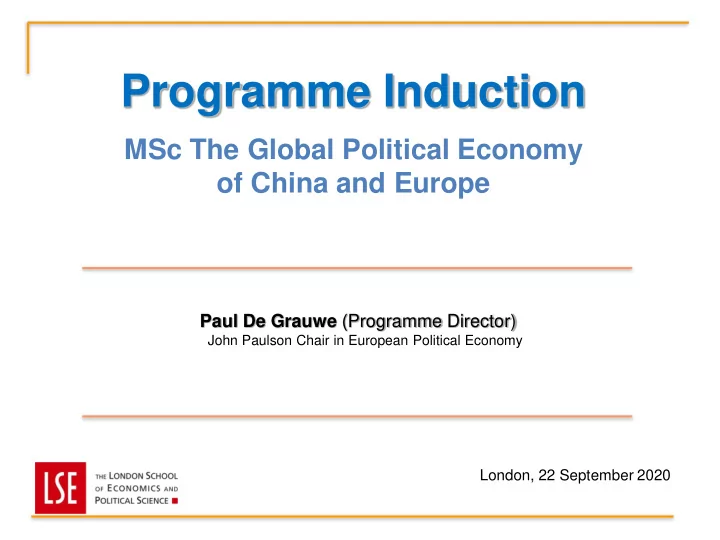

Programme Induction MSc The Global Political Economy of China and Europe Paul De Grauwe (Programme Director) John Paulson Chair in European Political Economy London, 22 September 2020
Welco come to the program ramme! ❑ What we will cover ➢ What we do / what is the degree about ➢ Who we are ➢ Programme structure ➢ Approach to studying and learning ➢ But first… A warm WELCOME OME
Learning at LSE “ Fortunate who was able to know the causes of things ” , Virgil Beaver: a hard working and industrious yet sociable animal
What t we do Politics… …and economics All pictures from Google Images
Political economy • What is this? – What are the political processes that determine economic decisions by politicians (mainly political science)? – How do these decisions affect the economy (mainly economics) – How do economic processes affect political decisions (political science and economics) • Intersection of politics and economics
Who we are Who we are ❑ A distinguished (and friendly) group of academics ➢ Leaders in their field; academic prizes, international standing, global recognition, involvement in policy-formation / impact ❑ An impressive line-up of Visiting Scholars ➢ Coming from both the academic and policy community ❑ A strong assembly of specialist Research Units ➢ Specialisations in thematic and geographical areas, with strong links to policy-making ❑ Arguably the top institution globally for the study of the Political Economy of Europe ➢ Ranked UK ’ s No1 for research on Europe continuously since 2008 ➢ One of the most impressive programmes of public events in Europe
The tech chnical ical stuff
Programme • Three compulsory courses – EU421 Policy-making in the EU – EU491 Political Economy in Theory and History – EU492 Political Economy of Integration and Fragmentation in Europe • Optional Courses to the value of one and a half units from a range of options (typically 3 courses taught in one term) • Policy Challenge (Capstone Project)
List of optional courses Courses to the value of 1.0 units from the following • EU443 European Models of Capitalism (0.5) • EU446 The Political Economy of European Monetary Integration (0.5) • EU453 The Political Economy of European Welfare States (0.5) • EU464 International Migration: EU Policies and Politics (0.5) • EU467 The Political Economy of the Neoliberal State (0.5) • EU469 The Political Economy of Finance in Europe (0.5) • EU477 Labour Markets and the Political Economy of Employment in Europe (0.5) • EU482 Europe in World Trade (0.5)
Courses to the value of 0.5 units from the following • EU457 Culture and Security in Global Politics (0.5) • EU458 Public Policy and Cultural Narratives in a Global Europe (0.5) • EU478 The Culture of European Politics (0.5) • IR416 The EU in the World (1.0) • IR468 The Political Economy of Trade (0.5)
Approach ach to learnin ing ❑ Where learning takes place ➢ the London / LSE / learning experience… ❑ How learning takes place ➢ Classes, seminars, readings, discussions, reflection – and all that ➢ Trial and error ➢ Curiosity as the drive of learning ❑ Why learning takes place ➢ To answer the “ why ” questions ➢ To answer the “how” questions ➢ Both questions matter
Last but not least ❑ Attend seminars, public lectures, etc… ❑ Event: Launch of the Fudan DD Programme ❑ Pre-Event meeting with Fudan representatives and students on ❑ Socialise with your colleagues and across LSE ❑ Enjoy London – but not too much…
Last but not least Ha Have a fi fine e year full of new learnin rning g experience eriences
Recommend
More recommend